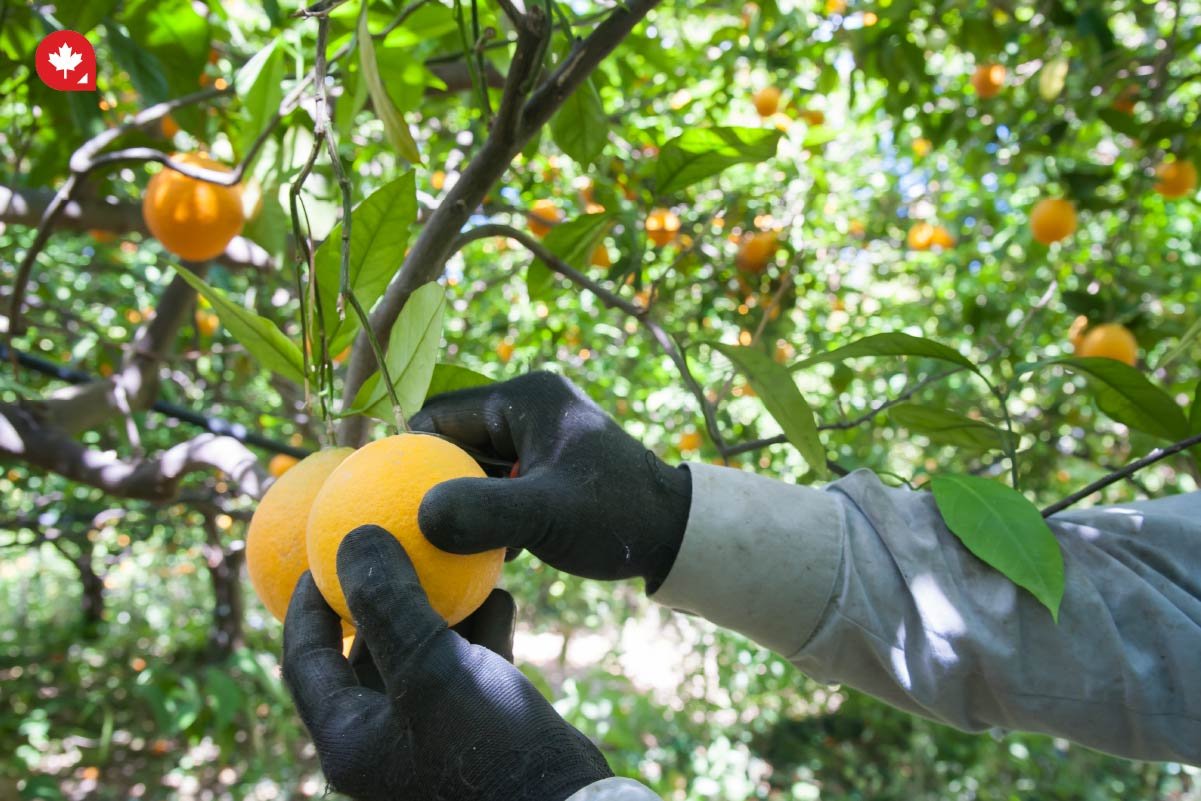Agri-food Immigration Pilot opens over 2,750 job opportunities for skilled farm and livestock workers looking to immigrate to Canada and apply for permanent residence. Given the amount of preparation time needed to apply for immigration, it certainly isn’t too early to begin the application process now, beginning by familiarizing yourself with the requirements of this pilot.
The Agri-Food immigration pilot program is industry-specific, aimed at attracting non-seasonal farm and livestock workers who intend to settle and remain in Canada year-round, particularly in the meat processing, animal raising, green housing, and mushroom production sectors. Eligibility for the pilot depends on having a valid job offer in one of the specialized occupations as well as your work experience.
Recruiting and retaining a skilled workforce is crucial for the success of Canadian farmers and food processors. The Agri-Food Pilot, launched in May 2020, assists in converting experienced workers in the agriculture and food industries into permanent residents of Canada. The Minister of Immigration, Refugees, and Citizenship, Sean Fraser, has declared an extension of the pilot until May 14, 2025.
How to Apply for Permanent Residency Under the Agri-Food Pilot?

To apply for this pilot, you will need to have a valid job offer and show that you are an experienced worker in one of the specified occupations within the meat production and agricultural sector. Below, you’ll find a step-by-step guide to getting permanent residency in Canada through the Agri-Food Immigration Pilot.
Step 1: Determine Your Employer’s Industry
Industries in North America are classified by the NAICS (North American Industry System). You will need the NAICS industry code when applying for your job, which you can get from your prospective employer. The eligible industries in the Agri-Food Immigration Pilot include:
- Meat product manufacturing sector (NAICS 3116)
- Greenhouse, nursery, and floriculture production, including mushroom production (MACS 1114)
- Animal production, excluding aquaculture (NAICS 1121, 1122, 1123, 1124, or 1129)
Step 2: Determine if Your Job is Eligible
Your job is classified by a NOC (National Occupational Classification) code. Below, you will find the qualifying occupations that fall under the new Agri-food Immigration Pilot.
| Eligible Jobs Under the Agri-Food Immigration Pilot | ||
|---|---|---|
| NOC Code | Occupation | Annual Application Limits |
| Meat product manufacturing industry (NOC 63201) (NOC 94141) (NOC 82030) (NOC 95106) | retail butchers industrial butchers Agricultural service contractors and farm supervisors Labourers in food and beverage processing | 1,470 1,470 50 730 |
| Greenhouse, nursery and floriculture production industries (NOC 82030) (NOC 85101) | Agricultural service contractors and farm supervisors harvesting labourers | 50 600 |
| Animal production industry (NOC 82030) | Agricultural service contractors and farm supervisors | 50 |
Step 3: Check if You Meet General Eligibility
In order to be considered eligible for the pilot you will need to meet all of the following criteria:
- Have 1 year of non-seasonal work experience (at least 1,560 hours in the past 3 years) in the same industry you are applying for;
- Have a valid full-time, non-seasonal permanent job offer in Canada for which the salary must meet or exceed the prevailing wage;
- Have a minimum CLB/NCLC score of 4 in either English or French;
- Have a Canadian high school diploma or an Educational Credential Assessment (ECA) of a foreign equivalent or higher; and
- Have enough money to support yourself and your family members, even if they won’t be moving with you to Canada.
It is important that you meet all of these requirements and can supply supporting documents at the time of application to avoid any delays in your Canadian visa application.
Changes Made to The Agri-Food Program

The Canadian government has made significant changes to the Agri-Food Pilot program to help support employers and candidates in the agriculture and agri-food sector. The pilot program was introduced in May 2020 to aid experienced workers in the agriculture and food industries in transition to permanent residence in Canada. The Honourable Sean Fraser, Minister of Immigration, Refugees and Citizenship, recently announced extending the pilot program until May 14, 2025.
To provide more opportunities for eligible candidates to apply, the Minister announced the removal of annual occupational caps that limit the number of candidates who can apply for a specific occupation under the pilot. Additionally, Immigration, Refugees and Citizenship Canada (IRCC) intends to introduce new changes to the pilot program in stages by the end of this year.
One of the changes includes expanding open work permit access to family members of all participants in the Agri-Food Pilot, regardless of the participant's job skill level. Another change will allow unions to attest to a candidate's work experience as an alternative to employment reference letters. Furthermore, applicants residing in Canada will have the option to meet the job offer requirement, including the median wage requirement for the job offer, or the education requirement, including educational credential assessment verification.
The program will also accept work experience gained under an open work permit for vulnerable workers, which will allow more workers to qualify. These changes will help meet employers’ longstanding labor market needs in the meat processing, mushroom, greenhouse crop production, and livestock-raising industries by filling ongoing labor needs with full-time, year-round employees.
These changes also aim to provide wider support to applicants and their family members, reduce barriers and vulnerability for candidates, and expand the pathway to permanent residence for experienced workers in these industries. The Agri-Food Pilot program complements Canada's existing suite of economic immigration programs, which includes the Atlantic Immigration Program, the Rural and Northern Immigration Pilot, the caregivers pilots, the Global Skills Strategy, Express Entry, and the Provincial Nominee Program. The pilot program promotes the skills and labour required in the agriculture and agri-food sector while providing an opportunity for these workers to settle in Canada and contribute to the country's economy.
Why Farm in Canada?

If you're considering farming as a profession, Canada might be a great place to do it. The country's vast land area, diverse climate, and abundant natural resources make it an attractive agricultural destination. Here are some reasons why farming in Canada could be a wise decision:
Rich and Fertile land
Canada has a vast amount of fertile land, especially in its prairie provinces like Saskatchewan, Manitoba, and Alberta. This land is ideal for cultivating crops such as wheat, canola, and barley, which significantly contribute to the country's economy.
Modern Infrastructure
Canada has modern infrastructure that makes it easy to transport goods across the country. The government has invested significantly in the country's road, rail, and air transport systems, making it easy to get products to market quickly.
Advanced Technology
Canadian farmers have access to advanced agricultural technology, which makes it easier to manage their farms efficiently. This technology includes precision farming tools, automated machinery, and advanced irrigation systems.
Stable Political Environment
Canada has a stable political environment that provides farmers with a predictable regulatory and business environment. The country has a strong rule of law, which means that contracts and agreements are legally binding, and the government generally respects property rights.
Supportive Government Policies
The Canadian government has several programs and policies in place to support farmers. These include tax incentives, financial assistance for new farmers, and research and development funding to help improve agricultural practices.
Growing Demand for Local Produce
There is a growing trend in Canada towards locally grown produce, which is creating opportunities for small-scale farmers to sell their products directly to consumers. This trend is driven by concerns over food safety, environmental sustainability, and supporting local communities.
FAQs
What Are the Benefits of Farming in Canada, and What Kind of Support is Available for New Farmers?
Canada has vast fertile land, modern infrastructure, advanced technology, stable political environment, and supportive government policies that make it an attractive destination for agriculture. New farmers in Canada can access several financial assistance programs, such as the Canadian Agricultural Loans Act, the Canada Emergency Business Account, and the Regional Relief and Recovery Fund. Research and development funding opportunities are also available to help improve agricultural practices, and farmers can access crop insurance and other risk management programs.
What Challenges Do Farmers Face in Canada, and How Can They Overcome Them?
Farmers in Canada face various challenges, such as weather variability, market volatility, and increased competition from global markets. They must also manage their operations efficiently while complying with various regulatory requirements. Farmers can leverage new technologies and farming practices, such as precision farming tools and automation, to overcome these challenges to improve their efficiency and profitability. They can also participate in industry associations and networks to access information, collaborate with other farmers, and advocate for their interests. Additionally, farmers can diversify their crops or value-added products, market their products directly to consumers, and seek alternative funding sources to mitigate risks and improve their bottom line.



